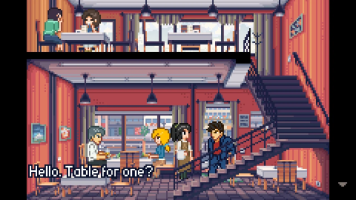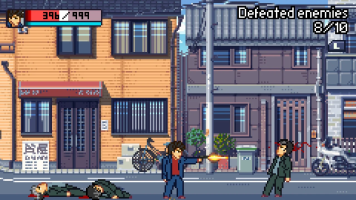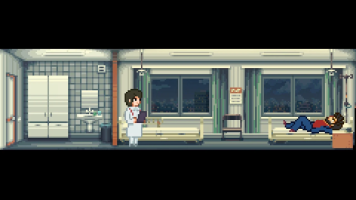Official Review
Developer Yeo (real name Vadim Gilyazetdinov), hailing from Moscow, has coded several titles of a similar ilk, known collectively as his Existential Dilogy. The former titles, The Friends of Ringo Ishikawa (2018) and Arrest of a Stone Buddha (2020) also borrowed from the Kunio-kun format. While notable for their experimentation and ambition, it feels like everything Yeo was seeking to perfect has come to fruition in his latest title, Fading Afternoon. Underpinned by a thoughtful, reflective narrative, everything from concept to execution is carried off with confidence and panache.
You play as Seiji Murayama freshly released from prison, a Yakuza thug with a shrouded past and a bleak future. Set in Osaka, you soon meet old acquaintances and reestablish bonds, free to explore a map full of quaint, characteristic streets and unique interactive locations. Initially, you're put up in a hotel by your gang, from which point you're free to move around Osaka by day, with the subway acting as a transit point to available locations. You quickly learn how to explore, strolling the streets, entering shops, offices and other points of interest, and meeting up with friends and foes occupying various positions and presenting various opportunities. One of the map's crucial indicators is 'War', which essentially means a rival gang will be present at a red highlighted area. Should you choose to engage in combat by throwing the first punch, you're quickly besieged by thugs. When in your own territory or territory won, Murayama often benefits from having a helper; but if he's on rival turf he has to single-handedly fend off his assailants.
With combat an essential part of progression, it's thankfully well implemented, feeling both manageable and satisfying. What's impressive is how expansive your repertoire is, and how cleverly it works with only two buttons. You can punch, kick, combo, roundhouse, tackle to the floor, parry, and crucially disarm opponents to use their weaponry against them. It feels good to slap a punk about and knock him to the floor, before whipping a gun from the hand of an encroaching hood to then turn it on his backup.
It's very adult, tonally, not just in its themes of illness, loss, painful memories, and the loneliness of gang culture, but in its visual violence. Combat is bloody, with broken bones, bullets to the head, and knives to the gut prompting an appropriate spray of crimson. The animation is superb, and bursting with character whether the sprites are smoking, sitting, or slinging a bag over their shoulder.
What sets Fading Afternoon apart is its life-simulator angle, and the attention to detail paid to it. To survive you really need to get to grips with taking care of Murayama-san. If you don't extend your hotel stay by paying for additional days, you'll suddenly be waking up on a public bench, where at one point we realised we had lost an important belonging without ever having understood its purpose.
Without the convenience of a bathroom where you can shave, Murayama eventually grows a thick beard with the passing of the game's impressive real-time day/night cycles. Wherever you happen to be, from morning to afternoon, sunset to nightfall, the colour palette shifts accordingly, changing the appearance of locations.
Money is essential to progression, and there are myriad, mostly criminal ways you can make it. Should you fall in combat, you'll wake up hospitalised and with a sizeable bill to pay. You can choose to approach the game as a poor, homeless ruffian, or rise through the ranks in wealth, sitting in cafes and topping up your HP with a coffee. Increasing your purse through brawling opens up the game's world. With money, you can purchase new clothes, be entertained in hostess bars, or take a swing on the Baseball range. Murayama is a smoker, able to light and extinguish a cigarette with real skill, squatting where he pleases to take in life as it moves by. Vending machines are available to top up your cigarette bounty, as well as other amenities.
At the same time, Muruyama-san's existence is a sad one, and the way his backstory is revealed, often in dream sequences, is engrossing. With its non-linear narrative, all of your decisions, successes, and failures alter the path you take and your eventual outcome, meaning it can be experienced in numerous different ways.
Fading Afternoon is best described as a 2D Yakuza game in a Kunio-kun mould. Yeo has made his pixel Osaka live and breathe so convincingly that it's a genuinely soothing experience to wallow in. The backgrounds are gorgeous — easily matching some of the Super Nintendo's best — and it all feels very authentic to how Japan actually is - like taking a holiday, of sorts. It's done with a subtlety, a realism, and a richness that makes every enterable door or stairwell compelling, your exploration opening up minigames, diverging plot lines, and chance character encounters.
Our only real criticism is that, initially, you're thrown in at the deep end, plot-wise. The talk is never overbearing or overwritten, but there are plenty of namedrops that you can't initially remember, and it takes a movie-type approach to drip-feeding its backstory and complex relationship web. This can make it confusing, initially, should you try to make a mental who's-who directory. Thankfully, as you become better acquainted with Osaka's streets and revisit key NPCs, elements of the plot take centre stage and you become more comfortable with where it's all headed.
Conclusion
Fading Afternoon is a very ambitious game that improves on Technos' decades-old Kunio-kun formula in almost every way. It's certainly the most accomplished of Yeo's works to date, and impressive in its polish. What really shines, though, is the way it expands on its life-simulator elements and those all-important details. It keeps things fresh, interesting, and compelling. Although regularly punctuated by satisfying gangland violence, it's not a fast game by any means. With its downbeat plotline and melancholic motifs, it's more an experience to become absorbed in, to be explored and tapped for all its little surprises and diverging paths on subsequent playthroughs. For everything it strives to achieve, beyond anything else, Fading Afternoon is incredibly charming.





